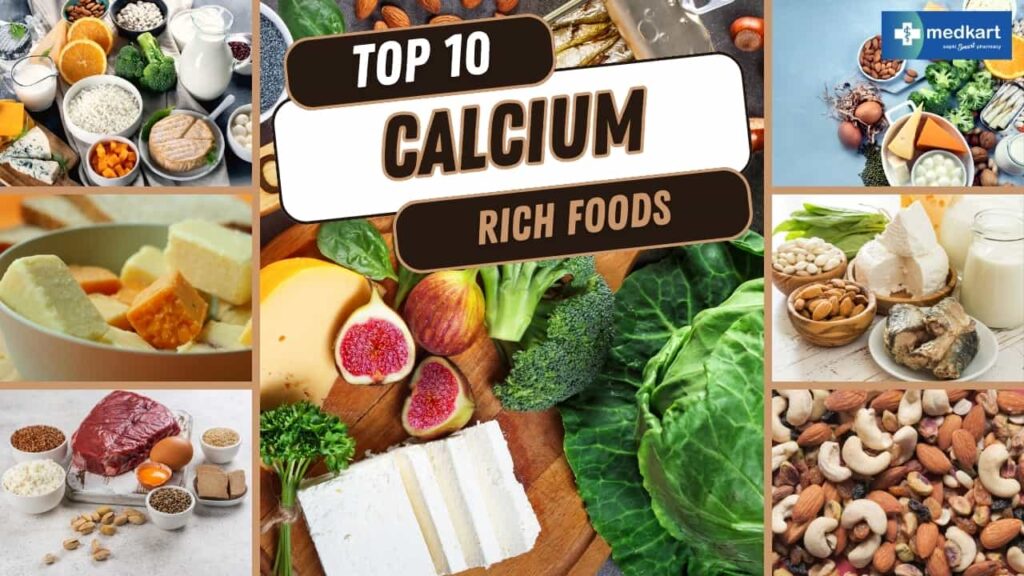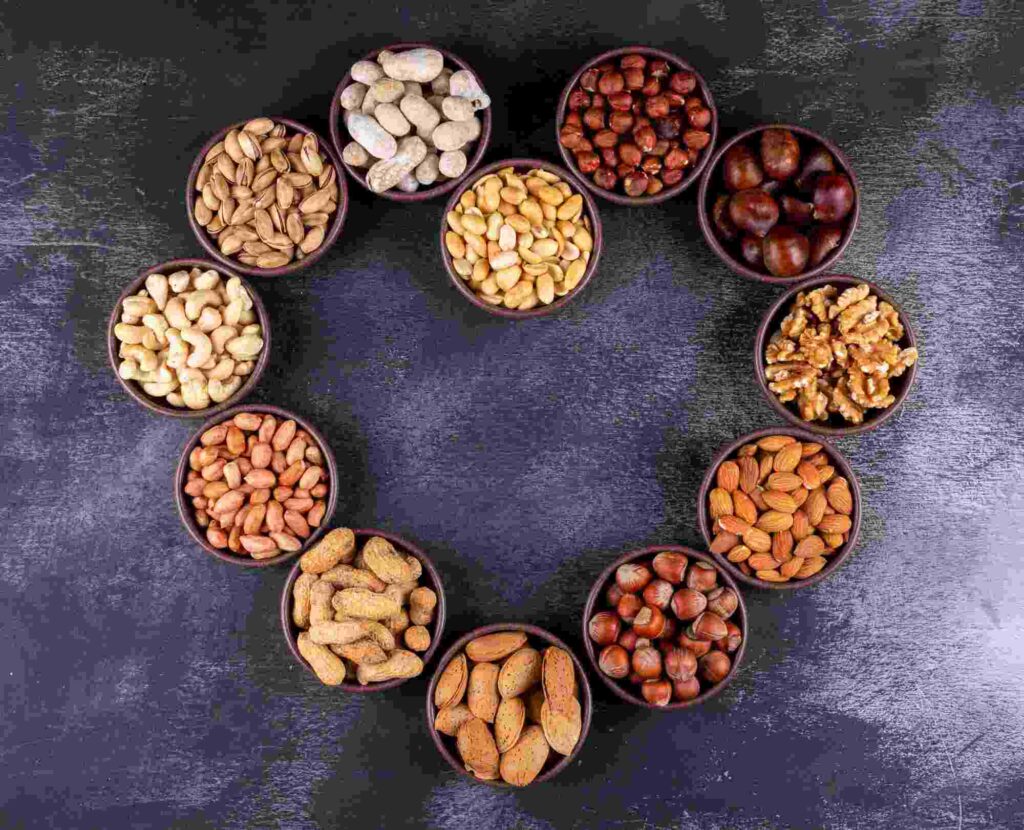Last updated on April 9th, 2025 at 05:36 pm

Calcium is essential for building and maintaining strong bones and teeth, aiding muscle function, and supporting the nervous system. Including foods high in calcium in your diet is crucial for overall well-being. Here’s a detailed guide on the top 10 calcium rich foods that can help you meet your daily calcium needs.
Top 10 calcium rich Foods
1. Dairy Products
Dairy products like milk, yogurt, and cheese are some of the best calcium foods available. A single cup of milk provides about 300 mg of calcium. Yogurt, especially Greek yogurt, is an excellent option, offering probiotics alongside calcium.
Tip : Use milk in smoothies or cereals to increase calcium in the body effectively.
2. Leafy Green Vegetables
Vegetables such as spinach, kale, collard greens, and broccoli are excellent calcium rich vegetarian foods. One cup of cooked spinach contains about 245 mg of calcium.
Tip : Combine these greens with other ingredients to make soups or stir-fries for a wholesome meal.
3. Almonds
Almonds are among the best calcium rich dry fruits. A handful of almonds (about 23 nuts) provides 76 mg of calcium, along with healthy fats, protein, and fiber.
Tip : Include almonds in your snacks or grind them into almond butter for a calcium boost.
4. Sesame Seeds
Sesame seeds are a traditional calcium rich Indian food. Just one tablespoon of sesame seeds contains 88 mg of calcium. They are also rich in magnesium, which complements calcium absorption.
Tip : Sprinkle sesame seeds on salads, curries, or flatbreads for added nutrition.
5. Tofu and Soy Products
Tofu is a powerhouse among foods high in calcium. Half a cup of calcium-set tofu can provide as much as 861 mg of calcium. Soy milk is another fortified option for those who avoid dairy.
Tip : Use tofu in stir-fries or curries to enhance your intake of calcium rich foods vegetarian.
6. Ragi (Finger Millet)
Ragi is an essential calcium rich Indian food, commonly consumed in South India. It contains 344 mg of calcium per 100 grams and is gluten-free.
Tip : Prepare ragi porridge, dosa, or roti to include it in your diet.
7. Oranges
Among calcium fruits, oranges are a tasty and nutritious choice. A medium-sized orange provides 65 mg of calcium. Additionally, they are high in vitamin C, which improves calcium absorption.
Tip : Snack on fresh oranges or include them in your salads and smoothies.
8. Chickpeas and Lentils
Chickpeas, black-eyed peas, and lentils are staples in Indian cuisine and good sources of calcium. A cup of cooked chickpeas provides 80 mg of calcium.
Tip : Include them in curries, stews, or salads for a high calcium foods chart addition.
9. Figs
Figs, both fresh and dried, are excellent sources of calcium. Just two dried figs provide 65 mg of calcium, making them a top choice among calcium rich dry fruits.
Tip : Add figs to your breakfast bowl or desserts for a naturally sweet calcium boost.
10. Amaranth (Rajgira)
Amaranth is a nutrient-dense calcium rich Indian food that contains 116 mg of calcium per cooked cup. It is also high in protein and iron.
Tip : Use amaranth in porridge, chapati, or as a grain substitute for rice.
How to Increase Calcium in the Body
- Diverse Diet : Incorporate a variety of items from the calcium foods list to meet your daily requirements.
- Pair with Vitamin D : Ensure adequate vitamin D intake, as it aids calcium absorption.
- Avoid Excessive Sodium : Too much salt can cause calcium loss through urine.
- Fortified Foods : Choose calcium-fortified cereals, juices, and plant-based milk.
High Calcium Foods Chart
| Food Item | Calcium (mg) per Serving |
| Milk (1 cup) | 300 |
| Yogurt (1 cup) | 245 |
| Almonds (23 nuts) | 76 |
| Spinach (1 cup) | 245 |
| Sesame Seeds (1 tbsp) | 88 |
| Ragi (100 g) | 344 |
| Oranges (1 medium) | 65 |
| Figs (2 dried) | 65 |
| Tofu (½ cup) | 861 |
| Chickpeas (1 cup) | 80 |
Including these items ensures a well-rounded intake of calcium rich foods vegetarian, helping you maintain strong bones and a healthy lifestyle.
Calcium Fruits
Fruits are often recognized for their vitamins, fiber, and antioxidants, but certain fruits also contribute to calcium intake, supporting bone health, muscle function, and overall wellness. While not as calcium-dense as dairy products or leafy greens, calcium fruits are an excellent addition to a balanced diet, especially for vegetarians and those seeking plant-based sources.

Top Calcium rich Fruits
1. Oranges and Orange Juice
Oranges, a citrus favorite, provide around 60 mg of calcium per medium fruit. Fortified orange juice is an even better source, offering up to 300 mg of calcium per glass. This makes oranges one of the most accessible and versatile calcium rich foods vegetarian options.
2. Kiwi
With about 34 mg of calcium per 100 grams, kiwis are a refreshing and nutritious choice. They’re also rich in vitamin C, which supports calcium absorption in the body.
3. Berries
Blackberries, raspberries, and strawberries are fruits with moderate calcium content. For example, blackberries offer approximately 29 mg per cup. These berries can be added to smoothies, yogurts, or salads.
4. Guava
This tropical fruit contains about 18 mg of calcium per 100 grams. Guava is also a fantastic source of vitamin C and dietary fiber.
5. Papaya
Papaya provides around 20 mg of calcium per cup. It’s a versatile fruit that can be consumed fresh, in smoothies, or as part of fruit salads.
Benefits of Calcium Fruits
- Natural and Refreshing : These fruits provide calcium alongside other essential nutrients like vitamins A and C, potassium, and antioxidants.
- Easily Digestible : Fruits are gentle on the stomach, making them a great option for those with dietary restrictions or sensitive digestion.
- Versatile : calcium rich fruits can be eaten fresh, blended into smoothies, or added to desserts and salads, offering flexibility in meal planning.
How to Incorporate Calcium Fruits into Your Diet
- Breakfast Boost : Add oranges, or papayas to your morning meal.
- Snacks : Munch on guava slices as a healthy midday snack.
- Smoothies : Blend berries, kiwi, or fortified orange juice into a nutrient-packed smoothie.
- Desserts : Use fruits like figs or oranges in fruit salads, yogurt parfaits, or as a topping for oatmeal.
While fruits may not be as calcium rich as some other foods, their nutritional benefits and natural sweetness make them an essential part of a calcium-focused diet. Pairing calcium fruits with other high-calcium foods, like leafy greens or fortified products, can help meet daily requirements while keeping meals enjoyable and diverse.
Calcium Rich Dry Fruits
Dry fruits, or dried fruits and nuts, are concentrated sources of nutrients, including calcium, fiber, healthy fats, and antioxidants. They provide a convenient way to increase your calcium intake, especially for those who prefer plant-based sources or need portable, easy-to-consume snacks. Calcium rich dry fruits are an excellent addition to any diet, offering both nutritional value and taste.

Top calcium rich Dry Fruits
1. Almonds
Almonds are one of the best calcium rich dry fruits, offering around 76 mg of calcium per 28 grams (about 23 almonds). Almonds are not only a great source of calcium but also provide healthy fats, fiber, and vitamin E. Eating almonds regularly helps promote bone health and supports overall well-being.
How to Use : Snack on raw or roasted almonds, add them to smoothies, or sprinkle them over salads and cereals.
2. Sesame Seeds
Sesame seeds are packed with calcium, providing about 975 mg per 100 grams. These tiny seeds are often overlooked, but are among the richest plant-based sources of calcium. Sesame seeds are also high in magnesium, iron, and healthy fats, making them a superfood for bone strength.
How to Use : Incorporate sesame seeds into your diet by sprinkling them on salads, adding them to baked goods, or using them in tahini (a paste used in many Middle Eastern dishes). Indian sweets like til ladoo are also a great way to enjoy sesame seeds.
3. Figs (Anjeer)
Dried figs are a delicious and calcium-dense fruit, offering approximately 162 mg of calcium per 100 grams. In addition to calcium, figs provide fiber, potassium, and antioxidants, contributing to digestive and heart health.
How to Use : Figs can be eaten as a snack, added to oatmeal or salads, or blended into smoothies. They also make a wonderful addition to baked goods and desserts.
4. Apricots
Dried apricots contain about 55 mg of calcium per 100 grams. They are also rich in vitamins A and C, which support immune health, and iron, which aids in red blood cell production.
How to Use : Dried apricots can be eaten as a snack, added to trail mixes, or included in fruit salads.
5. Dates
Dates are not only a great source of natural sugars and energy but also provide a modest amount of calcium—around 39 mg per 100 grams. Dates are also rich in potassium, magnesium, and fiber, making them a beneficial food for heart health and digestion.
How to Use : Dates can be eaten on their own, chopped into salads, or blended into energy balls and smoothies.
Conclusion
Calcium rich dry fruits provide a healthy, natural way to increase your calcium intake without resorting to dairy or supplements. They are nutrient-dense, versatile, and easy to incorporate into a variety of meals and snacks. By including a combination of calcium rich dry fruits like almonds, sesame seeds, and figs, you can enjoy not only strong bones and teeth but also improved digestion, heart health, and overall well-being.
FAQs On 10 Calcium Rich Foods: A Comprehensive Guide
1. What are the top 10 calcium-rich foods for better health?
The top 10 calcium-rich foods include dairy products like milk, cheese, and yogurt, leafy greens like spinach and kale, nuts like almonds, seeds such as sesame, tofu, fortified plant-based milks, beans, figs, oranges, and ragi.
2. Can vegetarians get enough calcium from plant-based foods?
Yes, vegetarians can easily meet their calcium needs by including plant-based options like leafy greens, tofu, ragi, sesame seeds, and fortified plant milks. Calcium-rich vegetarian foods are abundant and offer various choices for a balanced diet.
3. How can I increase calcium absorption from foods?
To increase calcium absorption, include vitamin D-rich foods like fortified cereals or sunlight exposure in your diet, and avoid excessive caffeine or salt. Pairing calcium-rich foods with magnesium and vitamin K can further enhance calcium utilization in the body.
Related Links :
Ways to Eat Chia Seeds for Healthy Benefits
Best High Protein Foods for Muscle Growth
What Are the Amazing Benefits of Dragon Fruit ?
12 High Protein Foods in Vitamin B12
The Ultimate Flaxseed Benefits
How to Gain Weight Fast and Naturally
